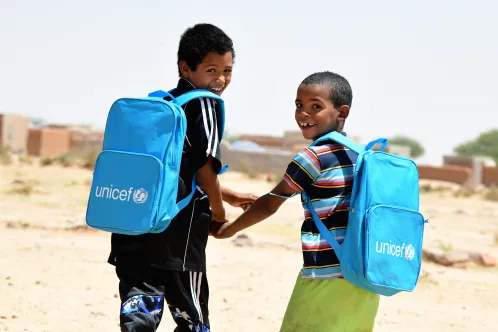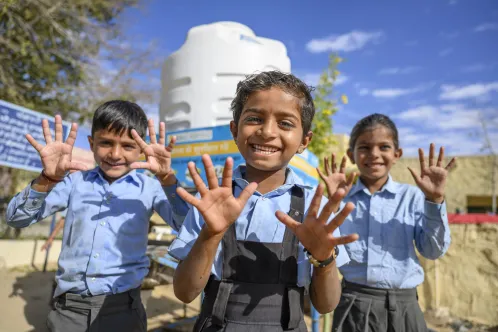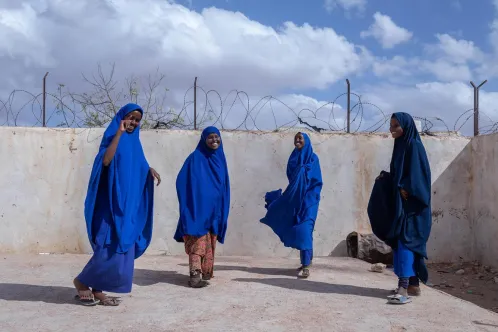Supporting Children’s Education
Education opens a new world of possibilities for children, and sets them up for a better, brighter future. UNICEF is helping children achieve their full potential by ensuring they have access to quality education.
THE LEARNING CRISIS IS DENYING CHILDREN ACCESS TO QUALITY EDUCATION
While more children are enrolled in schools than ever before, the lack of trained teachers, low-quality materials and poor infrastructure are making learning difficult for many students. A gap is growing between what children are learning, and the skills they need (such as literacy, social, digital and job-specific skills) to build a better future for themselves. This learning crisis hit a global scale even before the COVID-19 pandemic brought education systems to a halt.
- Nearly two-thirds of 10-year-olds in low- and middle-income countries cannot read and understand a simple story.
- Over 600 million children and adolescents don’t have adequate math and literacy skills.
Many more children around the world are deprived of education due to poverty, gender, ethnicity, disability and humanitarian crises. Girls, especially, experience many obstacles to education due to factors like cultural norms or a lack of proper, gender-specific water, sanitation and hygiene facilities in schools.
Without quality education, children face large barriers to employment and opportunities later in life. They are more likely to experience negative health outcomes and are less likely to participate in decisions that affect them, threatening their ability to shape a better future for themselves and their communities.
HELP CHILDREN REACH THEIR FULL POTENTIAL
UNICEF IS PROVIDING EQUITABLE ACCESS TO EDUCATION
UNICEF is working in 147 countries around the world to provide quality learning opportunities that prepare children and adolescents with the knowledge and skills they need for success.
We are making sure that access to quality education and skills development is inclusive for all children and adolescents, regardless of who they are or where they live. We are especially focused on reaching children who are excluded from education and learning because of gender, disability, poverty, ethnicity and language.
We are also working to close the gap between what students are learning and what they need to thrive in their communities and future jobs. We ensure children learn in a safe, friendly environment, have qualified and motivated teachers, and are instructed in languages they can understand.
From providing textbooks and classroom kits, to setting up child-friendly spaces where children can keep learning during a crisis or natural disaster, we help millions of children get an education every year.
In 2024, thanks to your support:
LEARN MORE ABOUT UNICEF’S EDUCATION PROGRAMS
WE ARE REMOVING BARRIERS TO GIRLS’ EDUCATION
Around the world, 129 million girls are out of school due to reasons like poverty, child marriage and gender-based violence. In some places, schools do not meet the safety, hygiene nor sanitation needs of girls. In others, because of inequitable teaching practices where boys are favoured, gender gaps in learning and skills development occur. UNICEF works with communities, governments and partners to remove barriers to girls’ education and promote gender equality in education, even in the most challenging settings.
WE ENSURE CHILDREN RECEIVE EDUCATION IN EMERGENCIES
Education is often the first service suspended by governments and the last to be restored during a crisis, despite the enormous benefits to children. In humanitarian emergencies, schools can protect children from physical dangers around them, provide life-saving food, water and health supplies, and offer emotional support to help children cope with the trauma they have experienced. UNICEF ensures uninterrupted education for children affected by humanitarian crises, especially for girls, children with disabilities, internally displaced children, and those who are refugees and migrants.



